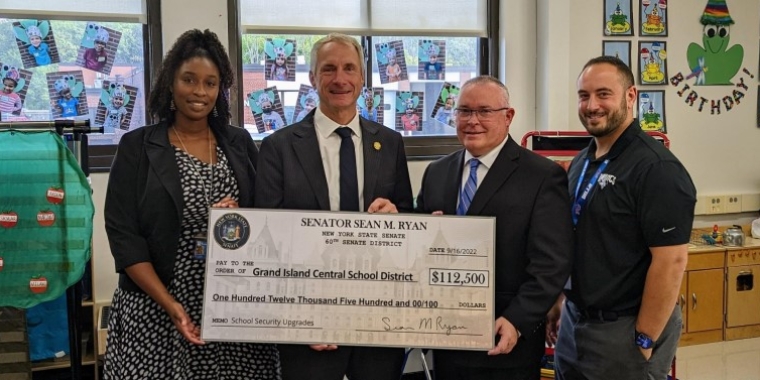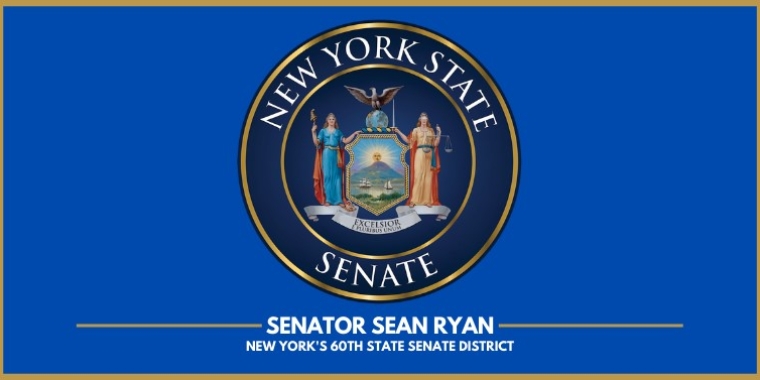
Advocates call on Gov. Hochul to fully fund free school meals for students in 2024 state budget (WBEN)

Photo Credit: Brayton J. Wilson/WBEN
Springville, N.Y. (WBEN) - The push is on from local officials, as well as school administrators, advocates, parents, and teachers for New York Gov. Kathy Hochul to fully fund the Healthy School Meals for All (HSMFA) initiative as part of this year’s State budget.
"During COVID, as we were handing out meals in front of our middle school and had lines of cars stretched out of our parking lot and down Newman Street, we all realized very quickly that food insecurity in our district, and in so many others is a real concern," said James Bialasik, Superintendent of Springville-Griffith Institute Central School Distirct, who hosted Friday's event at their Elementary School.
Both the State Senate and Assembly have supported restoring free school meals for all students in their one-house budget bills. With $280 million in funding for universal free school meals included in both budget proposals, now it is up to Gov. Hochul to ensure HSMFA is fully funded in the Fiscal Year 2024 State budget.
"We all know how important it is to give school kids the tools they need to thrive in school. But when we think of what tools they need, we rarely think of food as being part of those tools," said State Sen. Sean Ryan, who has backed this initiative in Albany. "The idea of sending a kid to school hungry, it's akin to sending a kid to school with an empty backpack. You can't learn with an empty backpack, and you can't learn with an empty stomach. ... A hungry child is a distracted child. A child can't focus on math and English if they're really focused on lunch."
Erie County Deputy County Executive, Lisa Chimera used to be a school teacher and understands lunchtime was a wonderful time for many students. It was often a time for students to talk with their friends, talk about their day, and even work on some schoolwork. However, knowing that some students were coming to school hungry, which affected their learning abilities, was maybe what stressed her out the most.
"They were the students in my class who were tired, their heads were on their desks. They were the students in my class who were unable to learn. They were the students in my class who were maybe even exhibiting some behavioral problems. And they were the students in my class who struggled, and it was heartbreaking. We should not be letting our children go hungry," said Chimera on Friday. "We should be providing them the food and the nutrition that they need, and they deserve. So we need to act, and we need to make sure that every student has a meal every single day, because lunchtime should be a joyous time for everybody."
For nearly two years during the COVID-19 pandemic, federal funding ensured students universal access to free school meals. When the federal waivers that provided the free school meals for students in New York expired, more than 726,000 students lost access to free meals at school, and families’ school meal debt has skyrocketed.
In the Western New York region, more than 78,000 students lost access to free school meals this year.
"When the waiver for free meals expired this past June, we set our prices on meals to pre-pandemic levels, but it was still not enough," Bialasik said. "Children were coming to school hungry, having friends buy them lunches, or just staying away from our cafeterias all together."
With that being a top issue with the Springville Board of Education, they went into action, passing a resolution to provide meals at no cost to students starting Jan. 17. With the resolution, every student at Springville schools had access to breakfasts and lunches they needed.
"When comparing the 40 school days prior to Jan. 17 to the 40 school days after Jan. 17, we have seen a 56% increase in the number of students getting breakfast, and a 23% increase in the number of students getting lunch," Bialasik said. "The number of students getting breakfast, who would fall into the category of paid on a regular basis, more than doubled. These are numbers to take note of."
"The studies are disheartening. One out of seven children in New York State experiences hunger," Sen. Ryan said. "We all have our preconceptions when we think about who's dealing with food insecurity. Rural people thinks it's urban people, urban people think it's rural people, suburban people thinks it's somebody else. But the data around the school districts in New York State, it's very similar. All walks of life, all corners of the state, people are experiencing food insecurity."
States across the country – including California, Colorado, Nevada, Maine, Connecticut, Massachusetts, and Vermont – have already implemented Healthy School Meals for All, and nearly 90% of New Yorkers support the policy.
While the resolution passed by the Springville district has benefited the students at the schools greatly, Bialasik acknowledges that in an already stretched budget, providing meals at no cost into the future may not be sustainable.
"There are hundreds of schools just like ours, and tens of thousands of students in those schools, and we want every school in New York to experience these benefits," Bialasik said. "Healthy [School] Meals for All should not come down to which schools can fit it in the budget and which can't. So today, we call on lawmakers in Albany to finish the important work on this initiative, and include universal meals in the final budget for New York State."
"There's been a lot of push in the Senate on this, and my colleague Sen. Michelle Hinchey, who works with the agricultural community, is really pushing this hard. But we've all sort of had a bit of an awakening. We know the free lunch program could be impactful," Sen. Ryan said.
"If we do the universal program, we don't have to fill out all the paperwork, we don't have to do the red tape, and we can just do what you want to do, which is feed kids, give them the tools to succeed as a student. But if you also think about New York State, we have a huge agricultural presence. The fact that a state as bountiful as New York State, with the crop yields that we have, no child should go hungry. So thanks to this coalition, the statewide coalition, everyone agrees we need to make sure kids come to school, they'll have a meal and they can learn."



